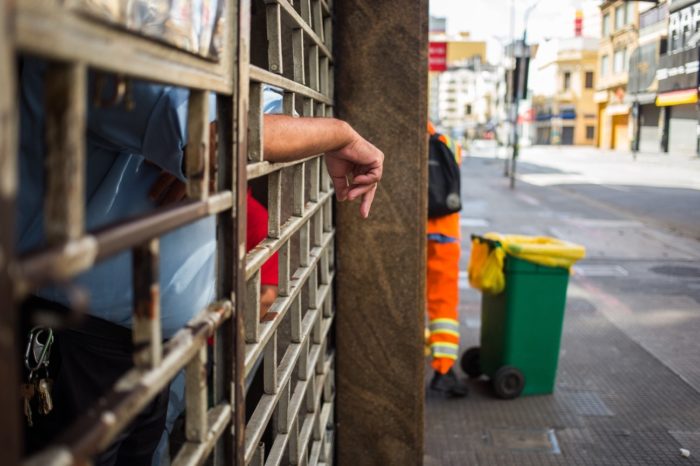
21 April 2020
LAB has just published our first true photo-story: São Paulo – the streets under social isolation a collaboration between sociologist Fraya Frehse and photojournalist Tiago Queiroz, and with the help of our web-designer Wes Boden. Do take a look and let us know if you think it conveys the story effectively.
Collated by Emily Gregg, LAB is continuing to publish updates to our comprehensive regional survey of the impact of Covid-19, government responses, and stories about the experience of particular locations and communities. Here are the 7 April and 16 April updates. Most, but not all of our articles this month relate to the Covid-19 pandemic.
LAB is busier than ever, with a steadily growing number of correspondents volunteering to write for us and sending in fascinating articles. The difficulty is our lack of resources the fact that we cannot afford to employ any staff to coordinate the work. Please donate, if you can, at this link. And if you can make your donation regular, or monthly, that will really help.
You can also help us by encouraging friends and colleagues to subscribe (it’s free!) to this newsletter. Just share this link with them.
Colombia
We continue the series of posts by our partner Christian Aid, reporting on its Ten Years project to support the country’s peace process, working with local partner CIJP. Follow the links to read the second, third and final posts.
By the way, an easy way to see all the blog-posts in our Christian Aid series is to go to the Blogs page and tick the box for Christian Aid under Filter by Blog. Similar filters exist on the News page to filter by country and/or topic. This is a powerful way of using LAB’s website to locate what you want to read.
Colombia, Peru and Panama have all attempted to implement gender-specific quarantine measures. LGBT+ communities have warned of the discriminatory effects this can produce and, as Persis Love reports, it has also led to several violent and homophobic attacks.
Brazil
As we have previously reported, Brazil is living under the threat of a vast escalation of the pandemic as President Bolsonaro openly defies social isolation, rushing into the streets of Brasilia on Sunday 19 April to join a rally calling for military dictatorship.
Earlier, an article by Luis Nassif on Brasilwire suggested that the Brazilian military under General Braga Netto were isolating Bolsonaro and assuming de facto control. This was supported by Jan Rocha in her latest LAB blog-post. Now the situation appears less certain, as the president sacks his health minister, Luiz Mandetta, and reasserts what remains of his waning authority.
Nothing more graphically illustrates the contrast between the care and dedication of social movements on the one hand, and the criminal irresponsibility of the president on the other, than these stories about the public health education work of volunteer communicators in the favelas, and the work of Brazil’s landless movement to distribute food and health advice.
Researchers at the Federal University of Rio de Janeiro warn that the virus is likely to produce a massacre in Brazil’s already grotesquely over-crowded prisons.
Indigenous communities and the Amazon
Thais Borges and Sue Branford, in one of their superb series of articles for Mongabay and LAB, warn that rainforest destruction and deforestation may make the world more vulnerable to virus pandemics.
In another original piece, Marcos Colón takes a journey through parts of the upper Amazon in Peru and Brazil and notes the extreme dependence of many riverine and indigenous communities on tenuous transport links to bring in essential food that they no longer grow themselves. ‘It’s not the virus that will kill us,’ some of them say, ‘but hunger’.
LAB translated an article by Joao Soares for Deutsche Welle, describing how indigenous people in the Amazon are braced for the arrival of Covid-19. While Daniel Wizenburg explains why it matters to all of us if the defenders of nature, land and biodiversity catch the coronavirus.
Other news
Venezuelan scientist Victor Álvarez, in another impassioned article, argues that the obduracy of both government and opposition in Venezuela is placing the entire population at imminent risk of catastrophe if the virus spreads. The actions of the Trump administration in demonising Maduro and his ministers are likely to torpedo any attempts to form a coalition government.
We received the sad news that Chilean novelist Luis Sepúlveda (author of Un Viejo que Leía Novelas de Amor) has died. We translated the El País obituary.
Best wishes,
The LAB Team
